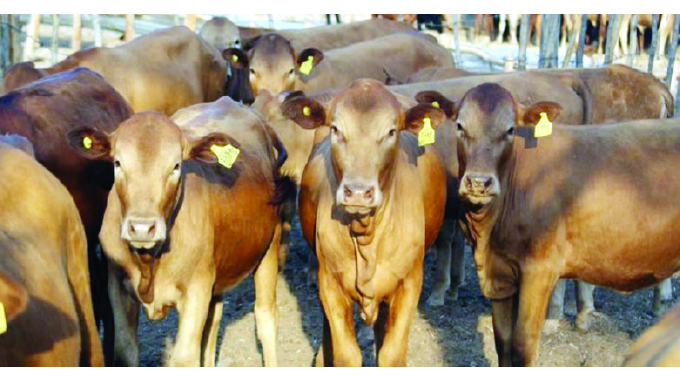Illegal livestock movements raise January disease risk in Matabeleland

Bongani Ndlovu, Chronicle Reporter
Cattle in Matabeleland South Province are at risk of January disease that was detected this month due to illegal movement of livestock.
January disease (Theileriosis) is transmitted by ticks and is more prevalent during the rainy season.
According to the Department of Veterinary Services, tick-borne diseases are responsible for about 60 percent of annual losses in livestock.
Although January disease deaths from the onset of the rainy season have dropped by 31 percent this year compared to last year, the fight against the tick-borne disease is being hampered by illegal movement of livestock.
Dr Jairus Machakwa, the director of Veterinary Field Services in the Ministry of Lands, Agriculture, Fisheries, Water and Rural Resettlement, said Matabeleland South is the latest province to be affected by January disease.
“Among the four-tick borne diseases the most prevalent/devastating has been January disease.
The disease was only affecting six rural provinces, with Matabeleland South (Insiza district) affected beginning of February, making them seven provinces sparing only Matabeleland North.
The spread is attributed to illegal movement of livestock infested with ticks from the neighbouring affected districts.
The most affected provinces have been Masvingo, Midlands and Mashonaland West,” said Dr Machakwa.
He said those who do not dip their livestock will face prosecution.
“The Animal Health (Cattle Cleansing) Regulations state that it is mandatory for farmers to produce all their cattle for dipping at each dipping session.
The department has begun prosecuting farmers who are not dipping their cattle, and farmers whose cattle are found to be infested with ticks,” he said.
Dr Machakwa said the Department of Veterinary Services has intensified visits to farms.
He urged farmers not to sell any sick animal for human consumption, adding that they should not fall prey to unscrupulous cattle buyers who invade disease infected areas to buy cattle at a song.
This practice is impoverishing farmers.
“Any farm with more than 30 cattle ideally requires a spray race, but some farmers continue to use manual knapsacks, which is tiring and hence the ticks are maintained in the environment,” said Dr Machakwa.
He said strict cattle movement controls are being implemented around the country to prevent moving infected cattle to uninfected areas, which would further exacerbate the situation.
“Government motorised its veterinary and agricultural extension workers, such that each extension worker today has received a motorbike. Therefore, access to farms has improved and cattle inspections and advisory services to farmers have improved very significantly,” said Dr Machakwa.
“Report promptly to nearest veterinary offices any cattle deaths or sickness for immediate attention and also to report all illegal movement of cattle into their areas to prevent spread of diseases. Farmers moving legally should ensure that the cattle are dipped or treated for ticks before movement. Failure to dip cattle and involvement in illegal movement, that is without a veterinary movement permit, are punishable offences under the laws of the country.”
Dr Machakwa said compared to the 2020/2021 season, cattle deaths have reduced.
“For the same period last year, the country lost around 2 335 cattle from November to mid-February while for the same period this season 2021/2022, the country lost 1 612 cattle.
“This represents a 31 percent decline in the mortality rate. The Department of Veterinary Services continues to push for a further decline. This is due to the many control measures that the Government, through the Department of Veterinary Services, has implemented which include intensive (weekly) cattle dipping, free supply of tick grease from the Presidential Input Scheme, the Blitz Tick Grease Program, and rehabilitation of dip tanks,” said Dr Machakwa.
He said besides tick-borne diseases, farmers should be on the lookout for other diseases prevalent during the rainy season such as lumpy skin disease (LSD) and foot rot.
“LSD is transmitted by biting insects like mosquitoes and all cattle above six months should be vaccinated against the disease annually preferably between October-November.
LSD is a viral disease with no known cure.
In severe cases of LSD, antibiotics may be used to prevent secondary bacterial infections,” he said.
“Livestock kept in muddy kraals are predisposed to foot rot and therefore provision of alternative kraals or paddocks can help prevent the disease.
Farmers need to provide dry environments for their cattle, as foot rot is caused by the wet muddy conditions.”
Dr Machakwa advised farmers to dip cattle religiously every week during the rainy season and the correct application of tick grease in between dipping sessions.
“During this time of the year 100 percent production of cattle at a dip tank is expected of every farmer in the country at every dipping session.
Commercial farmers are encouraged to intensify dipping during this period of the year.
In situations of continuous rains farmers are encouraged to consider pour-on applications which are not easily washed away by the rain from the soaked body.
Farmers need to appreciate that cattle dipping is not optional. It is mandatory,” he added.
Dr Machakwa said branding is mandatory according to the Animal Health (Livestock Identification) (Cattle) Regulations.
“Branding is a mandatory requirement. Movement controls are made easier when cattle are branded.
The Department and farmers are in all these interventions together. T
ogether we can win the war against these animal diseases that are threatening our livelihoods.
Cattle represent wealth.
They are our banks.
We need to guard them jealously,” he said.
– Follow on Twitter @bonganinkunzi










Comments